In between concerts in the USA and a couple of stops in Japan, the Klarafestival managed to bring one of the world’s most wanted guest conductors to Belgium. For their opening concert, the young German star David Afkham is tackling this year’s Faustian theme “Libera Me” head-on.
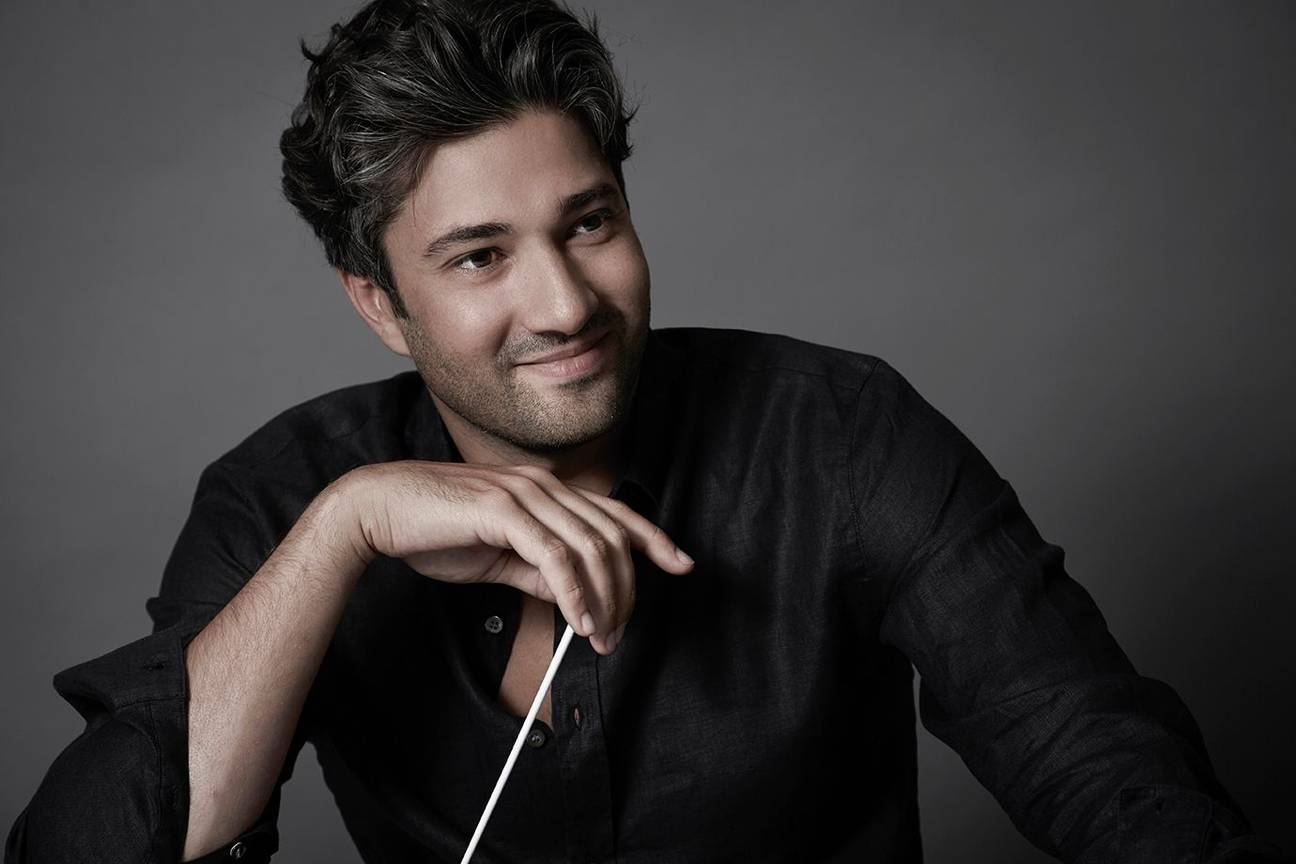
© Gisela Schenker
David Afkham kicks off the Klarafestival
For a brief period at the end of 2013 the Spanish National Orchestra and Choir were the talk of the town in classical music media across the world. El País, Spain’s biggest newspaper, quite righteously dubbed this “the Afkham effect,” because Spain’s biggest musical organization had just signed the, at the time only 30-year-old, German star conductor David Afkham. Mentored by none other than the legendary Bernard Haitink, he was then – and still remains today – one of the most wanted guest conductors in the world.
Transferring between (among others) the Concertgebouw Amsterdam, the Filarmonica della Scala in Milan, the Orchestre National de France in Paris, and the LA Phil. In a way that’s rather similar to a soccer star like, say, Zlatan Ibrahimovic who defended the colours of Ajax in Amsterdam, Inter in Milan, PSG in Paris, and LA Galaxy. Come to think of it, that sounds remarkably similar. “Of course there’s a market for young conductors, but I sure hope we’re not like football players yet,” David Afkham says.
But you do switch orchestra’s very often.
DAVID AFKHAM: Yes, but look at the maestro’s of the old generation, as early as the beginning of the 20th century. Conductors like Hans von Bülow and Arthur Nikisch could be performing at first in the Gewandhaus in Leipzig, then take the train to Berlin for a performance there, and then hop on a boat to the United States. Already at that time it was quite a busy life.
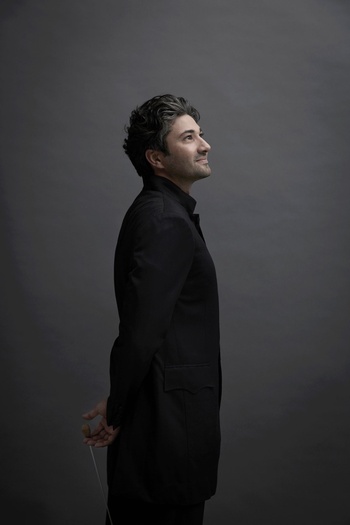
© Gisela Schenker
Isn’t it difficult to lead a new orchestra time and time again?
AFKHAM: I don’t feel like it is. You come to an orchestra with a vision of a piece of music. How it should sound, how you would like it played. It shouldn’t matter which orchestra it is. You’re just trying to achieve what’s best for the music and bringing the end result of that vision to the audience. Whether you’ve played with an orchestra a thousand times or if it’s a brand-new one is irrelevant.
But there has to be a reason you are able to work with such diverse organizations?
AFKHAM: It’s mainly a question of chemistry, acceptance, and openness of the ensemble. How far they can or want to go with you. Because they themselves have a tradition to take into account. The dialogue between yourself and the orchestra is extremely important. Because in discussing your vision they might offer you beautiful things and you start to think: “Well this is better, let’s take their idea.”
You must be quite the conversationalist then, pulling off that dialogue with so many different ensembles.
AFKHAM: You could say that. But it’s obviously not a walk in the park every time. It would be so much easier if I could communicate only with my hands and eyes and didn’t have to use words at all. Like I said, in the end it all boils down to chemistry. It’s an energy, a response between yourself and the orchestra. You know it’s a part of your profession to deal with that energy, and not avoid it. How to turn it into something where both sides can make the best of it. And I happen to believe in the good of the people. I think in the end, everyone wants to try and do the best they can and make the most of the music.
Keep the flame alive
At the Klarafestival, Afkham wil be guest-conducting both the Chamber Orchestra of Europe and Collegium Vocale Gent in a devilishly thrilling programme with works by Liszt, Mozart, and Mendelssohn. Especially that last one should come as no surprise. Afkham has previously called the German composer his “base for all other conducting, where I feel at home”, and it is certainly true that the Austro-Germans occupy a prominent place in his concerts.
I'm just trying to do right to the composer's wishes.
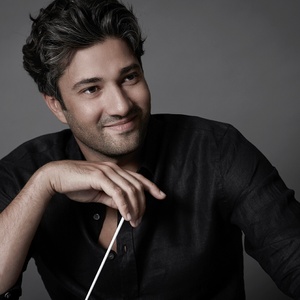
Here however the choice for the Teutonic giant is founded in the Klarafestival’s theme: “Libera Me.” Though inspired by the mythical Faust-figure, “Libera Me” makes for a very open-ended leitmotif which is prone to a satanic interpretation. It’s definitely not the first time Afkham is bringing out Beelzebub, as he has previously tried to make the devil dance in Shostakovich’s 15th symphony. “But it’s not something I go looking for. It’s all there in the notes. I don’t think I’m highlighting this or that. I’m just trying to do right to the composer’s wishes. The Shostakovich piece already is a danse macabre, it’s not up to me to make that even more so.”
Doesn’t a theme invite you to look at a piece of music differently?
AFKHAM: It’s always new. Even with pieces you’ve done before. Every time you take out the score, it’s always going to be new. There’s a different ensemble, a different orchestra, different conditions. You’ll always have a different frame. It remains the same core of course, but it’s shaping all the time. This is the beauty of life and art in itself. It should be alive. Like Mahler said: “Tradition should not be worshipping the ashes but keeping the kindling alive for future generations.”
It seems to me you filled your programme almost from a literary standpoint, more than a musical one.
AFKHAM: You simply can’t get around the fact that the theme comes from Goethe’s Faust, so you have to work with that. Then of course your head starts spinning with possibilities. The first thing that came to mind was Liszt’s orchestral pieces based on Nikolaus Lenau’s Faust. He was an Hungarian-Austrian author, just like Liszt. But the music Liszt poured from that is doubting and very introverted, so I feel it fits very well with the theme of Goethe’s version of the story.
Then from there, I kept Goethe in my head and came up with Die erste Walpurgisnacht, which is set on a text by Goethe, but not exactly his telling of the First Walpurgis Night in Faust. It’s a ballad all on its own, but the link with the theme is obvious. So yeah, there are a lot of literary references that link it all together, but they make for an interesting musical programme. Because they have the added bonus that they’re also pieces that we don’t get to hear so often.
Those are the more obvious links, but how does the Mozart concerto embody the theme of the festival?
AFKHAM: To me it fits because of its contrast. It is totally different when you compare it to the Liszt and the Mendelssohn. But that’s also what makes the programme complete. Because in the Mozart you feel this aspect of freedom of the human spirit, of the joy of life. I find it the most joyous music ever written. You truly find everything in Mozart. It characterizes every facet of a human being. And to me, Faust is a symbol of freedom of human spirit with all conflicts that are embedded with that.
KLARAFESTIVAL 14 > 29/3, various locations
CHAMBER ORCHESTRA OF EUROPE/COLLEGIUM VOCALE GENT 14/3, 20.00, Bozar
Read more about: Brussel-Stad, Elsene, Muziek, Klarafestival, David Afkham
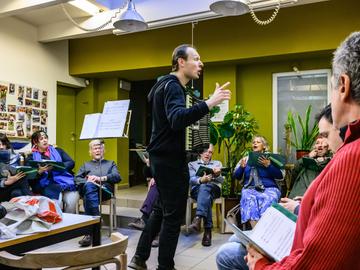
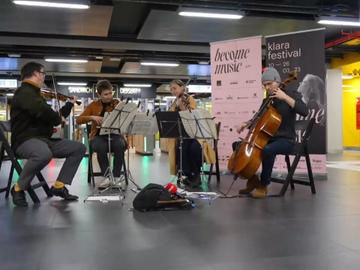
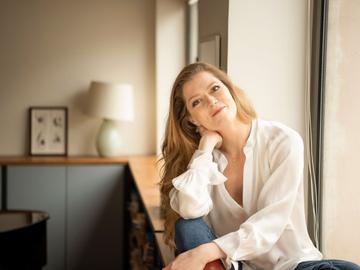
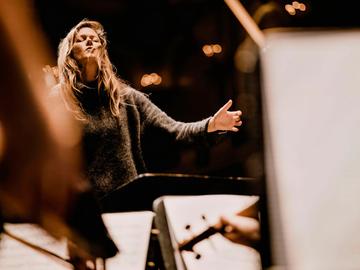
Fijn dat je wil reageren. Wie reageert, gaat akkoord met onze huisregels. Hoe reageren via Disqus? Een woordje uitleg.